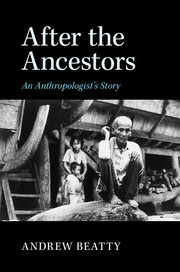Book contents
- Frontmatter
- Epigraph
- Contents
- List of illustrations
- Preface
- People
- Map
- Prologue
- 1 The statue
- 2 House key
- 3 Among women
- 4 Blood brothers
- 5 Daggers and debutants
- 6 Stormy Sunday
- 7 Three things that matter
- 8 The making of great men
- 9 A game of chess
- 10 Cholera song
- 11 Progress
- 12 Brothers and strangers
- 13 Exile and return
- 14 Field work
- 15 The chicken's neck
- 16 Good deaths and bad deaths
- 17 First family
- 18 Blessing
- 19 Half an egg
- 20 Waiting
- 21 Death of a chief
- 22 Ama Jonah at bay
- 23 Unravelling
- 24 The ethnographer and his double
- Epilogue
- Index
8 - The making of great men
Published online by Cambridge University Press: 05 March 2015
- Frontmatter
- Epigraph
- Contents
- List of illustrations
- Preface
- People
- Map
- Prologue
- 1 The statue
- 2 House key
- 3 Among women
- 4 Blood brothers
- 5 Daggers and debutants
- 6 Stormy Sunday
- 7 Three things that matter
- 8 The making of great men
- 9 A game of chess
- 10 Cholera song
- 11 Progress
- 12 Brothers and strangers
- 13 Exile and return
- 14 Field work
- 15 The chicken's neck
- 16 Good deaths and bad deaths
- 17 First family
- 18 Blessing
- 19 Half an egg
- 20 Waiting
- 21 Death of a chief
- 22 Ama Jonah at bay
- 23 Unravelling
- 24 The ethnographer and his double
- Epilogue
- Index
Summary
All over the hills of Gomo and the Susua valley, little hamlets, perched on hillocks above the river or straggling along its banks, maintain a quiet, strenuous existence amid the smothering forest. Most are not more than two or three generations old, as the height of the palms indicates, and some are no more than a huddle of rough wooden houses, visible at the last moment as you round a bend in the river. The bigger villages, such as Orahua, with their paved squares, megaliths and patchwork gardens, are more widely scattered. But in these safer times, the wild irregular spaces between have been colonized, and every few miles, in the midst of what seems like endless wilderness, you come across a cluster of dwellings with smoke floating from their thatched roofs.
These are rather different from the lonely field huts of pioneers, which represent a more determined, if temporary, exile from civilization. Hut people, as villagers conceive it, lead an animal existence, self-sufficient and barbarous. How could it be otherwise when their only companions are the monkeys, birds and tree spirits? These forest people lack the restraints of civilization – or perhaps lose their belief in its value. A stranger found near a field hut is likely to be killed or robbed; he is fair game. And a woman encountered in a remote spot may be raped. Desires in the wild are quickly and efficiently satisfied. Hut folk possessed by “pork cravings” will kill a pig and eat it themselves – something no villager would do, as meat is always either given or exchanged, and to consume your own is a kind of symbolic incest. Self-reliant like other creatures of the forest, hut people become strangers to their kin, uncouth outsiders. Living amid danger they become dangerous, and when they return to the soft life of the village, they are held in suspicion and awe.
- Type
- Chapter
- Information
- After the AncestorsAn Anthropologist's Story, pp. 118 - 130Publisher: Cambridge University PressPrint publication year: 2015



